Professional preparation at the Royal Conservatoire
At the Royal Conservatoire we endeavour to prepare musicians and dancers as well as possible for their future professional career. In light of changes in professional practice and various recent developments, preparation for professional practice, active collaboration with the profession and the development of entrepreneurial skills are more important than ever.
Students at our institution are prepared in various ways for the constantly changing national and international professional practice. One of the basic principles of our education is to train musicians and dancers to the highest possible artistic standard and so enable them to compete on the international labour market. Our students are guided in their artistic development by teachers who are themselves professional artists. We also understand how important it is for students to come into contact with professional situations during their studies through collaborations with professional partners. We attach great value to the development of entrepreneurship and professional skills, and continuously evaluate whether those elements are properly integrated into the curriculum. We also invite the students themselves to actively think about their future careers and to demonstrate their ability to function as ‘reflective practitioners’ in the profession.
Click on a segment below for more information on professional preparation in our various programmes or click here to read our professional preparation statement in full.
In the performance departments, since 2020 the development of professional skills has been embodied in Career Skills courses, which cover both ‘soft’ and ‘hard’ skills. These courses are incorporated in the curriculum in such a way as to provide an integrated and continuous learning trajectory from year one up to and including year four (B1-4). The Career Skills courses are Start-Up!, Learning Lab for Singers, Entrepreneurial Bootcamp, Meet the Professionals and Preparation for Professional Practice. Recurring topics are communication, self-management, artistic identity, and becoming aware of career possibilities.
In addition, the Bachelor of Music curriculum includes a large number of practical courses in which students learn the skills they need to succeed in a mixed professional practice. This component of the curriculum embraces a wide range of courses, including Educational Skills, Critical Music Studies, Chamber Music, Performance Skills and Training Orchestral Parts. These courses are supplemented by projects in cooperation with professional partners such as Side by Side, an annual project in which students rehearse and perform a concert programme alongside the professionals of the Orchestra of the 18th Century.
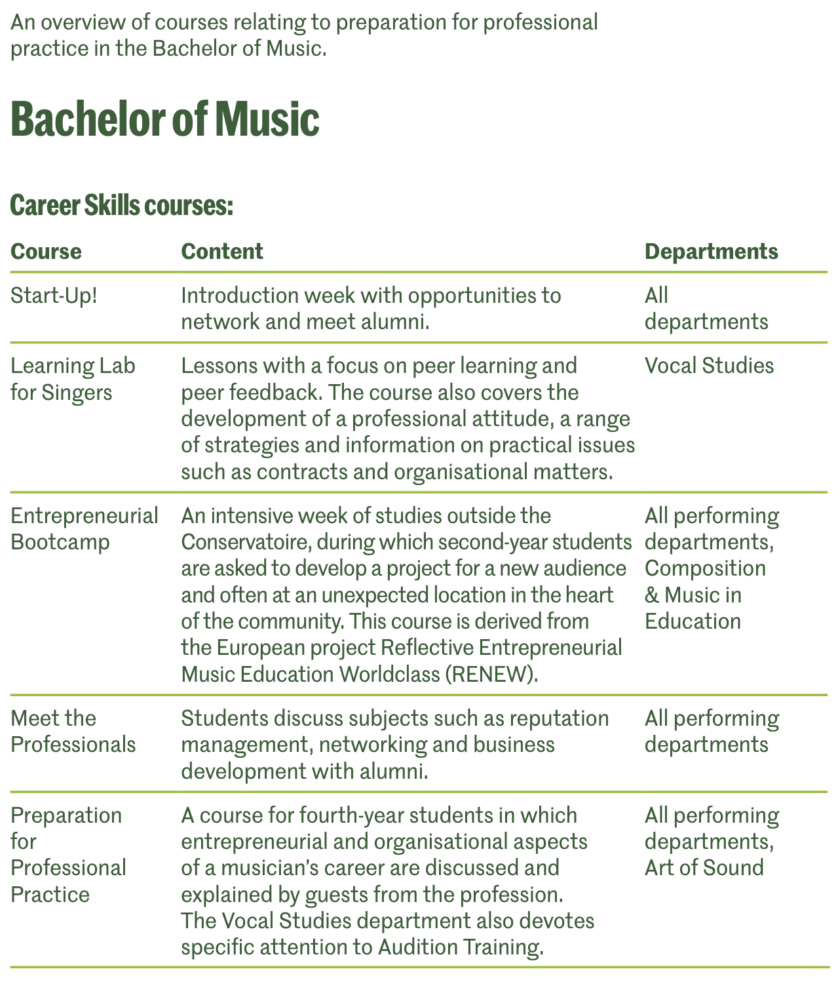
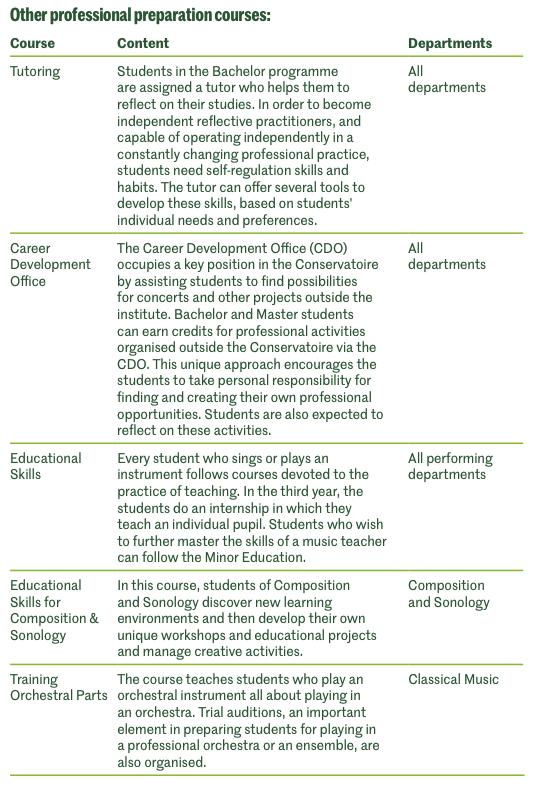
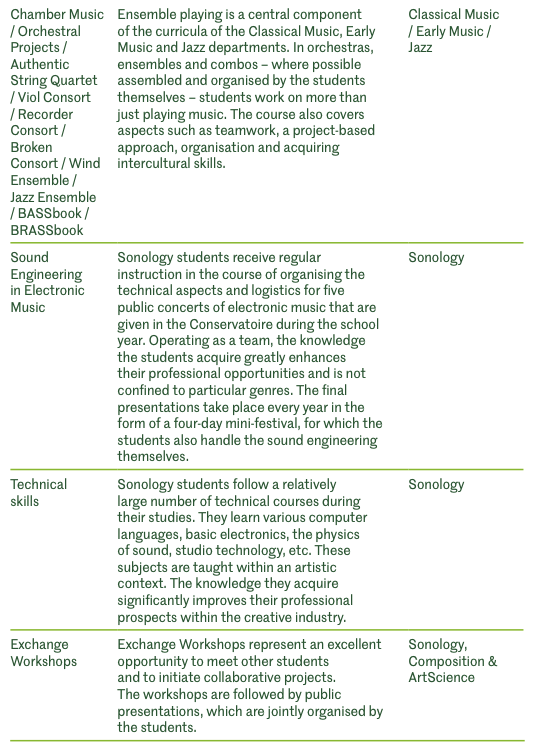
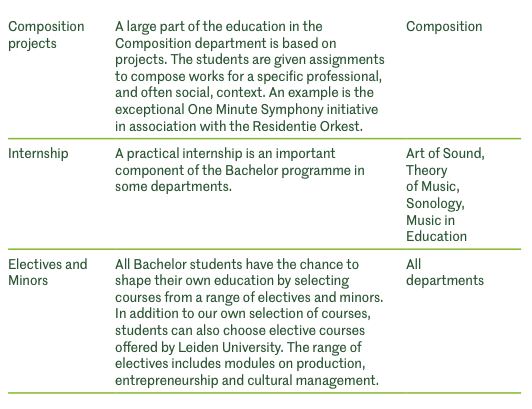
There is close collaboration between the Bachelor of Dance programme and the leading Dutch companies such as the Nationale Ballet, Introdans, Scapino Ballet Rotterdam, and in particular the Nederlands Dans Theater (NDT). Every year, the programme organises the Young Talent Project in association with the NDT. The Bachelor of Dance curriculum also includes courses devoted to professional preparation, including Study & Career Planning (a course in which students develop their capacity for self-study and self-reflection, learn how to write a CV, make a video for an audition and learn the intricacies of contracts), Creating a Solo (to enhance their ability to use and develop their artistic and creative competencies, reflective powers and research skills) and Health & Well-being (a course which covers various elements intended to prepare the student physically and mentally for a professional career). Students in the final year do a practical internship, for example with a professional company or the Royal Conservatoire Dance Ensemble or through participation in an external professional dance project.
The clear thread running through the Music in Education programme is the intensive practical internship, through which the students gain realistic and hands-on practical experience. Through orientation visits and internships, students come into contact with the various target groups, from primary and secondary schools to the work terrain outside the field of education. In the fourth year, students choose a domain for their internship. They are strongly encouraged to work together and to show initiative. For example, the students organise the annual cultural trip themselves. Through the Entrepreneurship course and the various projects, they are introduced to the commercial, creative and organisational aspects of cultural and independent entrepreneurship.
The Case is an annual music-theatre project by the Music Education department, in collaboration with the Art of Sound department of the Royal Conservatoire The Hague. Students work together in an interdisciplinary way, bringing their many ideas, original arrangements, compositions, and surprises together into one dynamic performance.
Our Master curriculum builds on the Bachelor curriculum: while we prepare Bachelor students for professional practice, our aim is to enable Master students to integrate into the professional practice. In this way, the Master students already gain a foothold in the profession during their studies. This integration is achieved in two ways:
- Professional integration in the form of a Master Project, which is designed to promote self-reflection and entrepreneurship in relation to the students’ artistic development.
- Professional integration by means of integrated Master programmes in association with professional partners.
1. Professional integration in the form of a Master Project
The Master of Music curriculum encompasses three domains: Artistic Development, Research and Professional Integration. In addition to advancing their personal artistic development (in the instrumental/vocal/composition lessons) and conducting research under the guidance of a research supervisor, students also work with a professional integration coach in pursuing professional activities. The vehicle for this is a Master Project, in which students are given the opportunity to create their own project that combines artistic development, research and professional integration activities. This is our way of giving students the opportunity to experiment in the process of developing a personal professional practice during their studies. Accordingly, the students can immediately apply the skills and ideas they have acquired and any projects and collaborations they have formed as soon as they graduate.

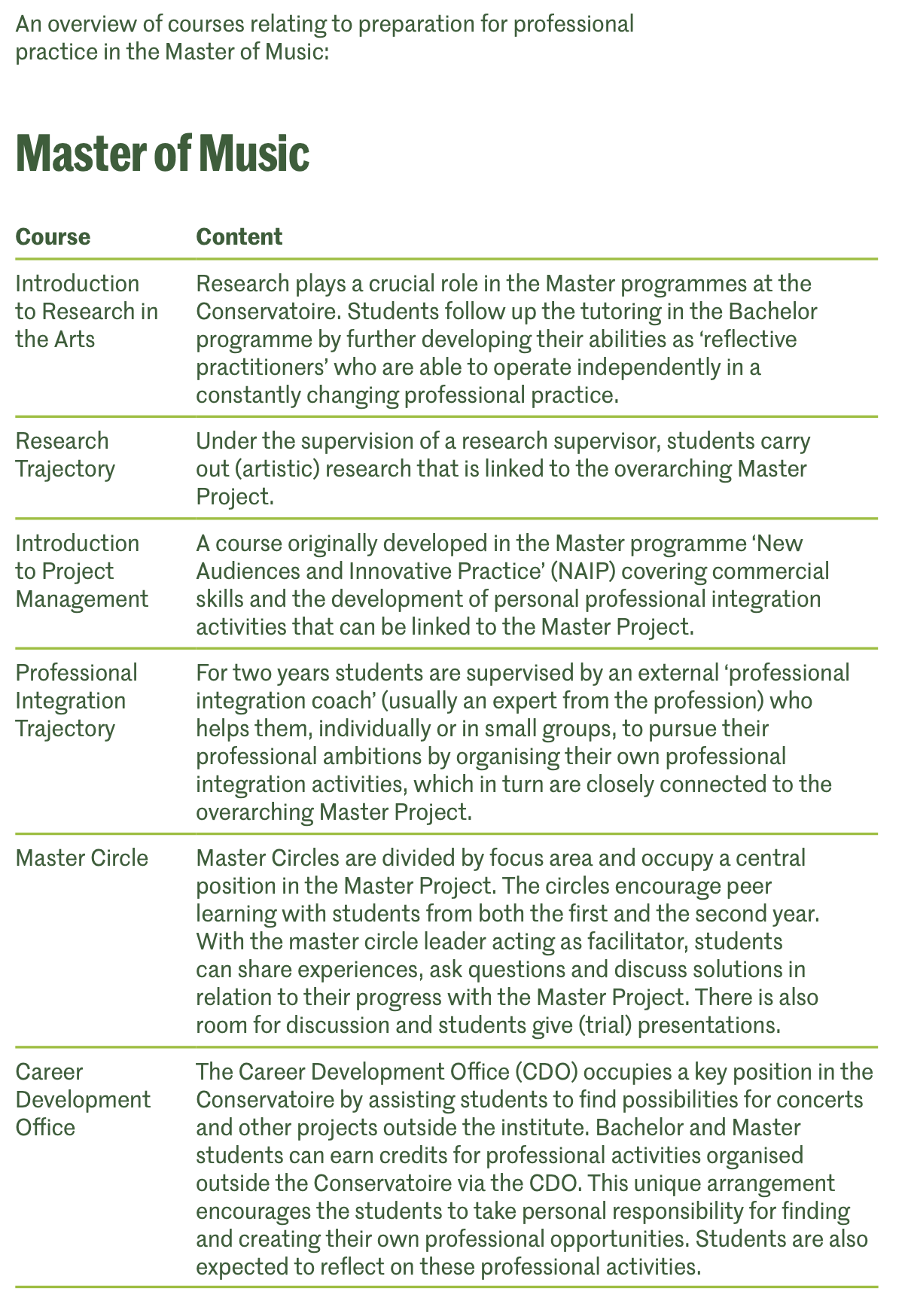
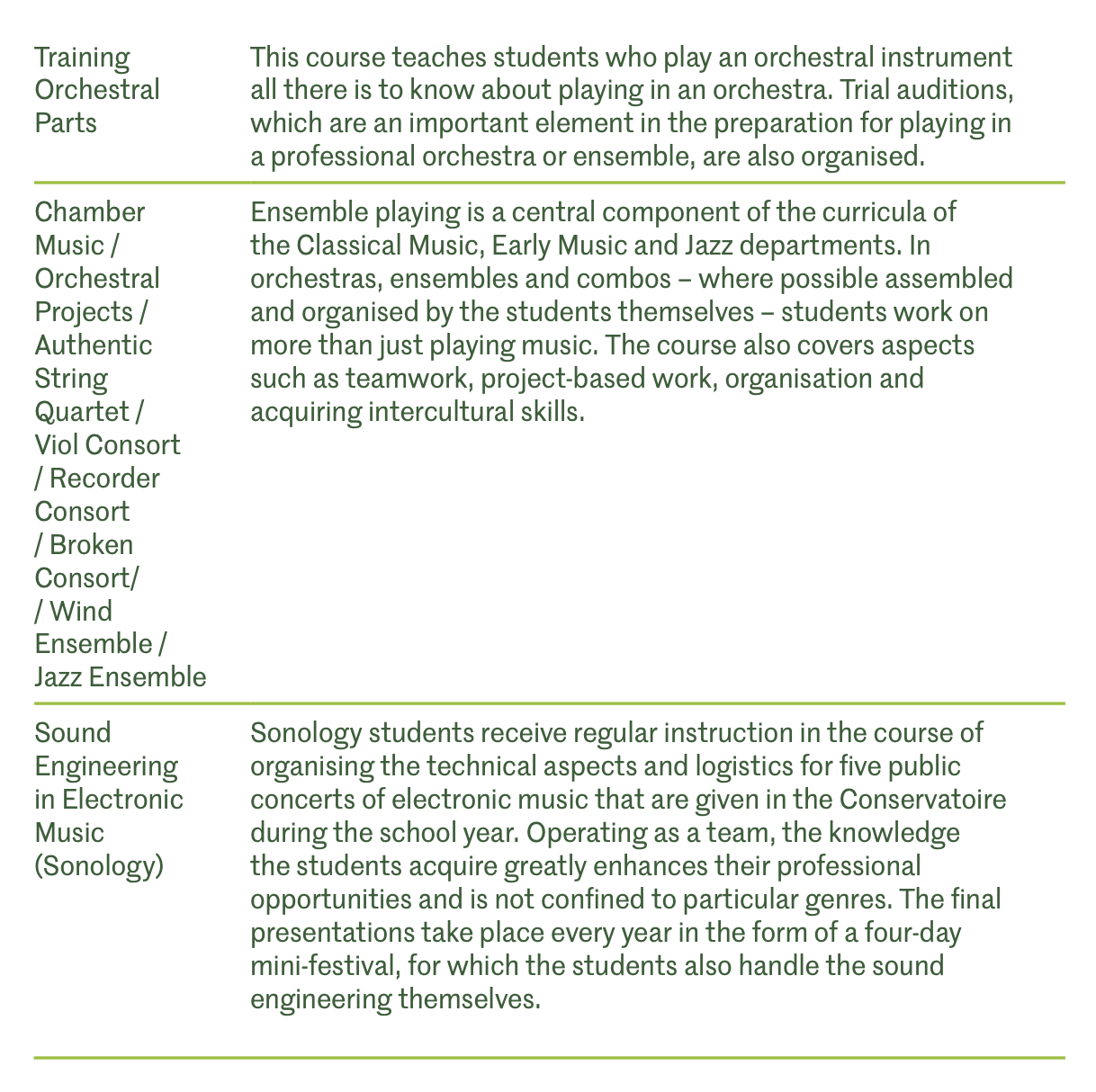
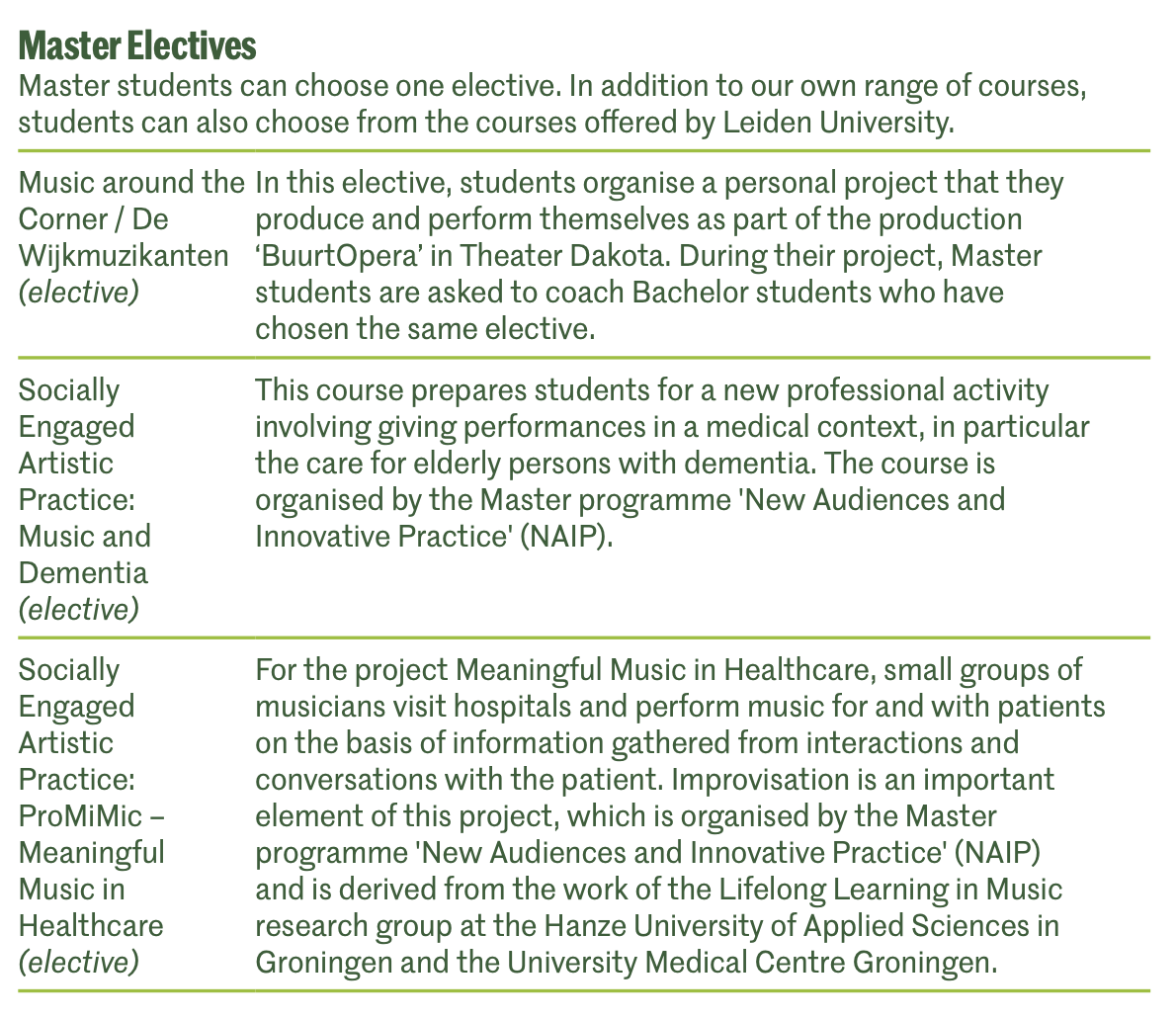
2. Professional integration through integrated Master programmes in association with professional partners
We offer a number of unique Master programmes that have been designed in consultation with professional partners. In these programmes, teaching and practice are intertwined to give students a realistic impression of the profession and thus give them the best possible preparation for the reality of the professional practice. This process usually leads to the creation of new ensembles and enables our students to provide an impulse for professional partners.
An overview of the exclusive Master programmes with our professional partners:
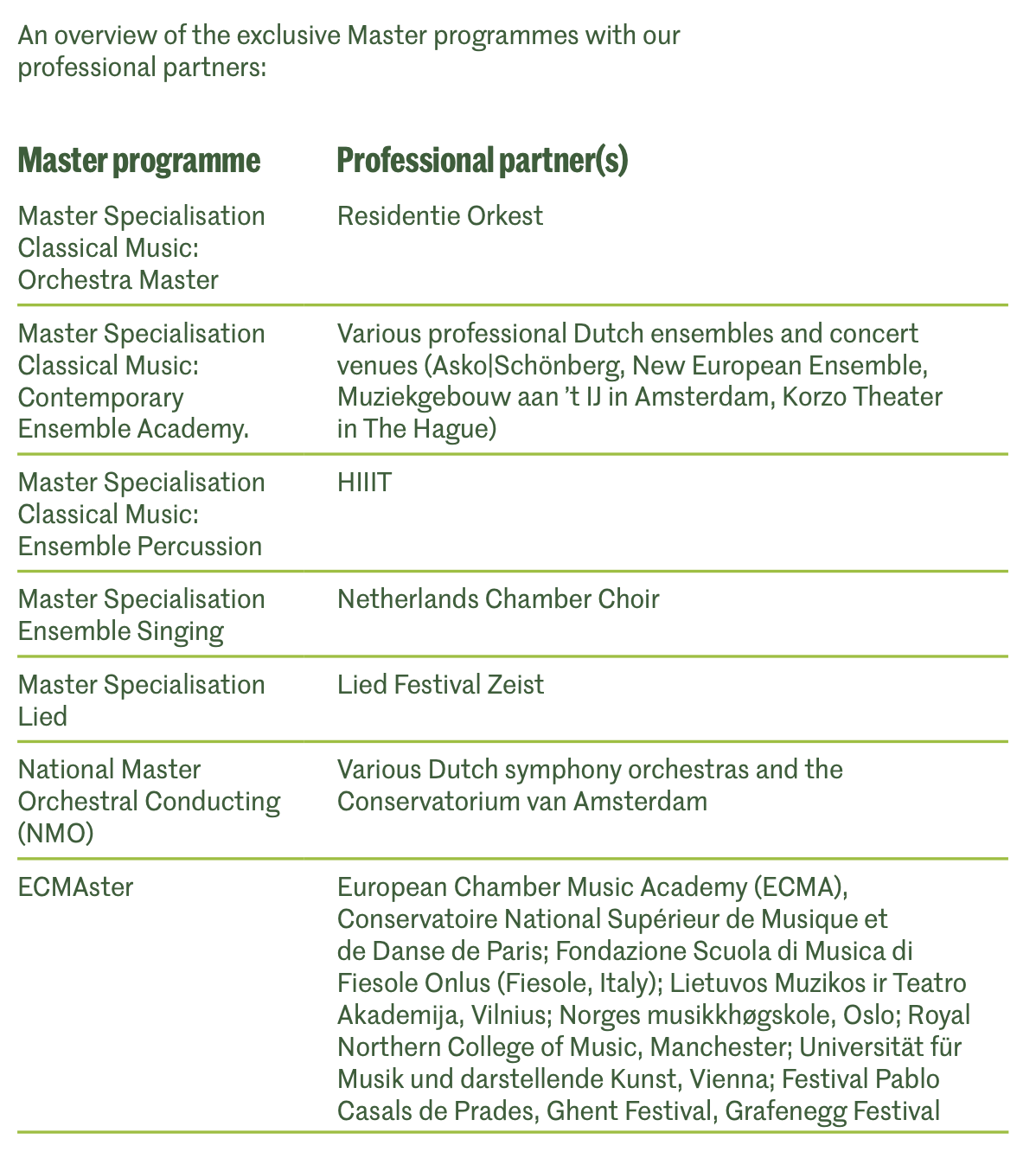
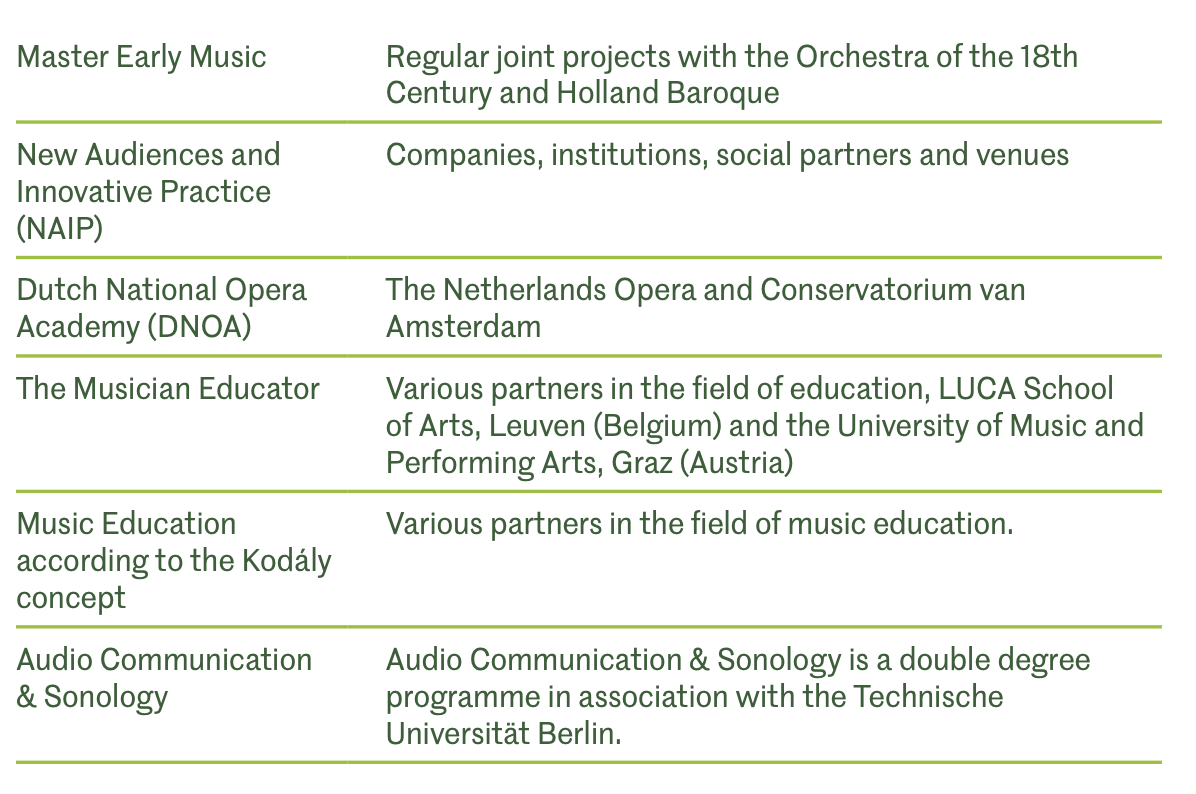
The Composition department focuses on developing the students’ creativity and versatility, encouraging them to carry out research and helping them to discover their own identity as composers. Through project-oriented education, students develop their own contemporary music practice while collaborating with instrumentalists and singers in performances of their work. This is done mainly in association with musical theatre workshops, art academies and various music ensembles and venues such as the New European Ensemble, Ensemble Klang, Kluster5, Slagwerk Den Haag, Gaudeamus and Korzo. The One Minute Symphony in association with the Residentie Orkest is just one of the many examples of projects for the Composition students. During these projects, the students are also confronted with aspects such as production, publicity and rehearsals with musicians and are working in a professional environment.
The commercial aspects of professional practice are highlighted in the Production and Publishing for Composers course. This course includes various experts from the profession as guest speakers and offers insight into the areas of concert production, online production, curation, funding, promotion and the world of publishing. In Educational Skills for Composition & Sonology, bachelor students are introduced to new learning environments before going on to develop their own workshops and educational projects and manage creative activities. Students actively help to organise the Spring Festival, an annual event devoted to the latest works by the Composition students, by arranging musicians and taking care of the production, programming and marketing, making this annual event a perfect preparation for professional practice.
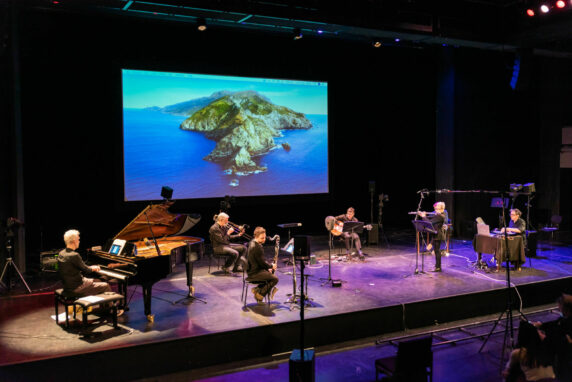
The Royal Conservatoire’s Institute of Sonology has an extensive network of professional partners, including the Groupe de Recherches Musicales (GRM) in Paris, the Dutch Music Institute (NMI), Studio LOOS in The Hague, the Technische Universität Berlin, the Herz-Labor van het Zentrum für Kunst und Medien (ZKM) in Karlsruhe, the Willem Twee Studios in Den Bosch, the V2_Lab for the Unstable Media in Rotterdam and The Game of Life in The Hague (see also www.sonology.org/links-connected-institutions). Students regularly attend and participate in workshops, give concerts and present papers at festivals hosted by these partners.
The Bachelor of Music in Sonology offers a unique combination of courses covering both the technical and artistic aspects of electroacoustic music and its varied applications. In addition, students discover new learning environments in the reshaped Educational Skills for Creative Artists course, and then go on to develop their own unique workshops and educational projects and manage creative. In the third year, students do an intensive internship and gain experience and establish important contacts in the professional community. Internships are offered by for example ARTEk, New Emergences, Soundtrackcity, Studio LOOS, V2_, WORM and Willem Twee.
In the Master of Sonology, students carry out a personal research project with a theoretical and a practical component. The project is documented in a thesis and the artistic results are presented at a public festival organised by the students themselves. Academic skills are very useful skills for future professionals, who will regularly participate in conferences such as the International Computer Music Conference (ICMC), the New Instruments for Musical Expression (NIME) conference and the Sound and Music Computing (SMC) conference. Commercial aspects of a professional career are discussed in the Project Management and Presentation course, with topics such as drafting business proposals, schedules, budgets, funding requests, planning projects, and the importance of creating your own visible profile on the internet.
Sonology alumni work as composers, performance artists, sound designers, computer programmers, sound engineers and teachers, or combinations of these disciplines (see www.sonology.org/bachelors-alumni and www.sonology.org/masters-alumni). A relatively large number of students choose to go on to study for a PhD after completing the Master programme.
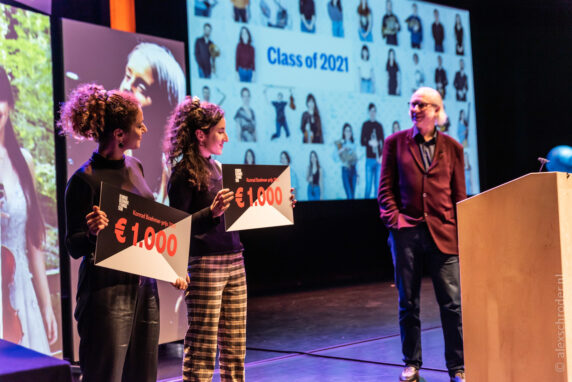
After graduation, students can sign up to the Alumni Community, a network that keeps the Conservatoire’s alumni in touch with one another as well as organising events. The Alumni Community has an online international directory and an interactive job board. Our alumni are also actively involved in the education, for example teaching in the Career Skills courses Start-Up!, Meet the Professionals and Preparation for Professional Practice in the Bachelor of Music programme. In the Master of Music programme, the professional integration coaches who supervise students in professional activities are usually alumni.
The Royal Conservatoire, the Residentie Orkest, and Nederlands Dans Theater have moved to the new Amare complex in the city centre of The Hague. This means that the Royal Conservatoire’s vision of the importance of actively collaborating with the professional community and stimulating entrepreneurship in students – in addition to providing top-class artistic education – will be even further developed. Over the coming years, the exploration of opportunities provided by being in the same building with these important professional organisations will be an important priority. Sharing a building will create new and unique opportunities for artistic growth, pedagogical development and intensive collaboration, for example through joint productions and programmes, interdisciplinary courses, educational outreach projects and internships. Additionally, from this new location, we will be looking to expand our social and cultural network. This will create further opportunities for students to become actively involved in society and thus enhance their entrepreneurial skills.
For more information about Amare please visit their webpage www.amare.nl/en or learn more on the Royal Conservatoire which is housed in Amare.
We are a truly ‘glocal’ conservatoire through our international connections and collaborations, and especially as we are now part of IN.TUNE (Innovative Universities in Music & Arts in Europe). IN.TUNE is the only European Universities Alliance in the field of music and arts. Together with seven other European universities, the Royal Conservatoire The Hague was selected from over 60 applications by the EU Commission.
The IN.TUNE partners are committed to intensive cooperation in education, research, curricular innovation and societal engagement. Alongside the University of Arts The Hague, the IN.TUNE partners include the Norwegian Academy of Music Oslo, Conservatoire National Supérieur de Musique et de Danse de Paris, University of Music and Performing Arts Vienna, Escola Superior de Música de Catalunya Barcelona, Uniarts Helsinki, National University for Music Bucharest, and University of Arts Belgrade.
In light of changes in the situation of professional musicians and artists due to rapid technological developments and shifts in professional roles, the IN.TUNE collaboration will further develop the ongoing adaptation of pedagogical practices and strategic concepts of higher education institutions.
For more information, see intune-alliance.eu.
